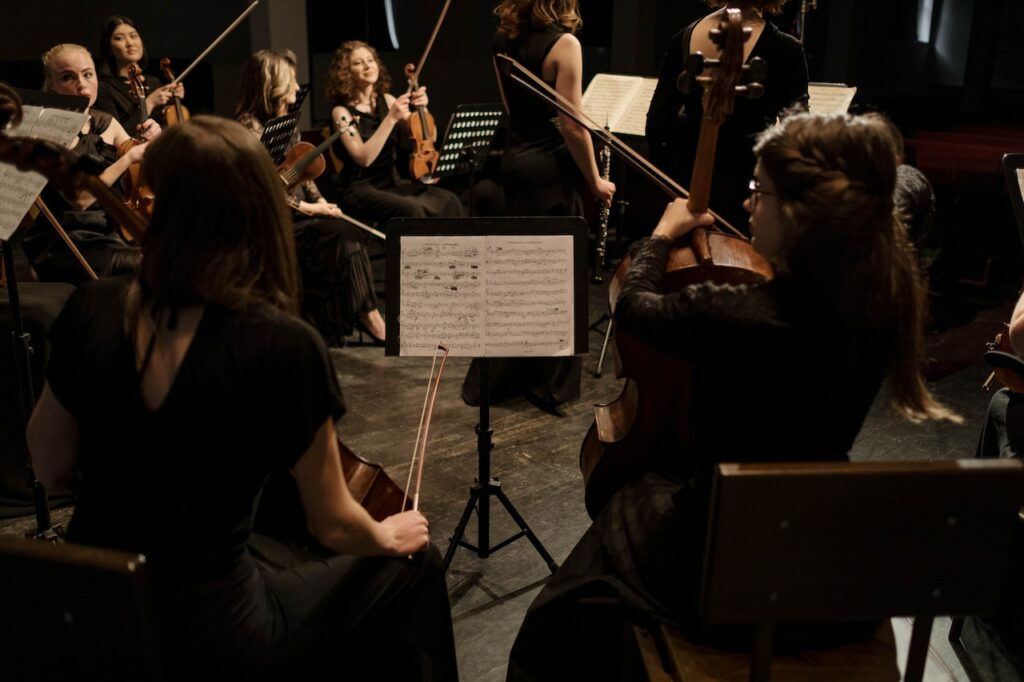Is classical music copyrighted?
Copyright protection and classical music is a widely searched topic. You may be wondering what copyright protection does, well, it covers original literary, dramatic, musical, and artistic works of authorship. This is during the lifetime of the author, the remainder of the calendar year in which the author dies, plus 70 additional years (the Canadian copyright lifespan recently increased from 50 to 70 years in June of 2022). Once this term expires, the work becomes public domain.
The public domain is composed of millions of creative music works – including classical music. This includes the masterpieces of classical composers like Mozart, Wagner, Beethoven, and Vivaldi. Because they are public domain works, these classical music pieces may be freely copied, distributed, adapted, or performed in public without permission or paying a fee – royalty free.
However, if Beethoven’s 5th Symphony is in the public domain, how are many publishing companies claiming copyright ownership in these classical music works? After all, Beethoven has been dead for more than 70 years! Shouldn’t they be royalty free music?
To start, don’t assume a classical music piece is in the public domain. To make proper use of classical music in the public domain, it is important to understand how copyright law works in Canada and the differences between musical works and sound recordings.
Copyright Laws in Canada
Canada’s Copyright Act defines a musical work as “any work of music or musical composition, with or without words, and includes compilations thereof.” Classical compositions are considered musical works and are, therefore, protected by copyright law.
Intellectual Property protection (copyright law) begins once the composer creates and fixes the composition (piece of music) in a tangible form, which usually means writing the musical notation in the form of sheet music. The protection expires 70 years after the composer’s death. At that point, it becomes part of the public domain. Therefore, the musical compositions of Mozart, Wagner, Beethoven, and Vivaldi are free to copy, distribute, adapt, or perform in public.

Join Our Community
Be the first to read new articles, industry news, and more. Sign up to our newsletter today!
Copyright Protection & Classical Music – Past, Present, Future
Many years ago, in the late 19th century, before the advent of audio recording devices, copyright protection for musical compositions was all that was necessary to protect a composer’s intellectual property rights. However, with the arrival of audio recording devices, a second form of music copyright, commonly known as “sound recording rights,” was created to protect recorded performances.
In Canada, sound recordings are defined by the Copyright Act as “a recording, fixed in any material form, consisting of sounds, whether or not of a performance of a work, but excludes any soundtrack of a cinematographic work where it accompanies the cinematographic work.” Unlike a music copyright, copyright in the sound recording protects the way a piece of music is performed and recorded. Also, the term of protection is shorter, lasting for 70 years after the first publication of the sound recording.
The Duality of Copyright Protection
Therefore, two sets of copyright protection exist in every sound recording — the right in the composition, and the right in the sound recording. Practically, when an artist records themselves playing Beethoven’s 5th Symphony, the creator owns the copyright in the recording and the arrangement. The same happens when a record company records a recording of the song and includes it as a track on an album. The record company will own the copyright in their own version of the recording and arrangement.
Copyright Intricacies
Each sound recording made of Beethoven’s 5th Symphony, whether made at home by an artist/composer or in studio by a record company, will be protected by copyright law. Regardless of the number of versions of a sound recording, there will only be one copyright in the underlying composition. So, when you are listening to Beethoven’s 5th Symphony on the radio, it’s not just the song you are listening to, it’s also the performer’s arrangement of that piece, which is also protected by copyright, and therefore cannot be used without permission from the sound recording’s creator(s).
What About Copyright in Films
In a related content, when a film producer wants to use specific songs in a film project, they will require synchronization rights from the song’s writer(s) and master use recording rights to use a specific pre-existing recording. If the master use rights are too expensive, especially if the recording features the song’s writer, the film producer might consider re-recording their own version of the song to avoid paying an expensive master use license. However, the additional costs to re-record a song might cancel out the cost savings of avoiding paying the master use fees.
Conclusion
To conclude, do not assume that a piece of music is in the public domain simply because the composer of the underlying musical work died more than 70 years ago. Even when a composition is in the public domain, the sound recording is still protected, and its copyright owner has exclusive rights to that arrangement for 70 years after the first publication of the sound recording. However, copyright law does not prevent you from performing, copying, distributing and recording your own arrangement of Beethoven’s 5th Symphony or any other musical composition found in the public domain.
© 2015 Edwards Creative Law, LLP
Updated to October 21, 2022
Edwards Creative Law is Canada’s Entertainment Law Boutique™, providing legal services to Canadians, and international clients who partner with Canadians, in the Film & Television, Music, Video Games and Apps, Publishing and Literary industries.
For more information or to set up a minute Discovery Call with one of our entertainment lawyers please feel free to Contact Us.
* This blog is for general informational purposes only and is not to be construed as legal advice. Please contact Edwards Creative Law or another lawyer, if you wish to apply these concepts to your specific circumstances.
Check out our popular blog posts:
Neighbouring Rights in Canada – Being a Musician is a Business
Setting up a Music Publishing Company in Canada
Copyright Protection & Classical Music
Work Made for Hire Explained
10 Co-Production Considerations in Canada – Ask an Entertainment Lawyer
Film Profits & Points – Ask an Entertainment Lawyer
The “Just Trust Me” Legal Agreement
Learn more about our services:
Film and Television Law
Music Law
Video Game and App Law
Publishing and Literary Law
Employment Law
Dispute Resolution and Litigation Law
Corporate Law
International Services


